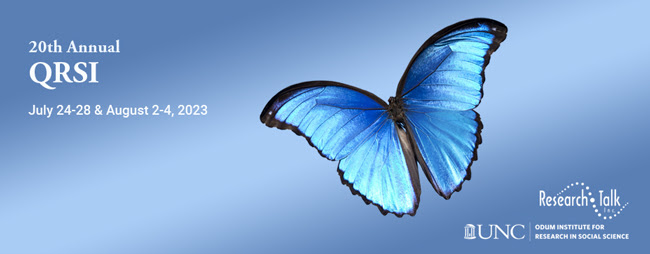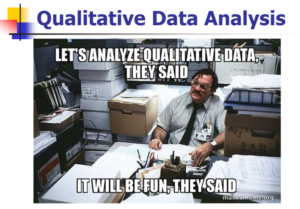post by Jenn Layton Annable (2020 cohort)
As an autistic PhD student, the benefits and opportunities gained at Postgraduate Summer Schools are of course the same for me as everyone else. As an autistic person though, the travel, overwhelming venues and intense social interaction can make attendance often challenging and sometimes impossible. The chance to participate in the two-day online ‘Fundamentals of Qualitative Research’, part of the wider 20th Annual Qualitative Research Summer Intensive, which was delivered digitally was a chance to attend a summer school avoiding the associated difficulties I have because of my neurodivergence.
The classes were led by Johnny Saldana across both days; a highly experienced qualitative methods researcher and author, with content adapted from his book ‘Qualitative Research Analyzing Life. Prior to registering for the summer intensive class, I discussed the course with my supervision team, sharing its outcomes along with the background and professional experience of Johnny. Specific points of connection to my own work were Johnny’s focus on arts-based methods, an area of research which had emerged as relevant to my academic disciplines, positionality and aspirations.
The fundamentals class was advertised as being suitable for beginners, to gain a wider understanding of qualitative methods, as well as a refresher for more experienced academics who also wanted to develop skills and experience in teaching qualitative enquiry in the context of their practice. These different aspects of the course and its convener made it applicable to my current PhD research stage. As I am writing my year one progression review document, I am required to complete a methods and methodology statement. Despite engaging with different texts, I felt I lacked confidence and knowledge in this area because I had yet not been able to find a taught course relevant to what I was interested in. The fundamentals course offered the chance to evaluate the conclusions I had reached about which methods I hoped to use, learn more about how to develop a research study design that included them and justify the choices I had made, or not, in my progression review.
Having started my PhD journey six months into the pandemic I have engaged with numerous and varied platforms, formats and degrees of success in the delivery of study materials. One of my earliest memories within the Horizon CDT lockdown offering was that of a teams call where the sound simply would not be made to work, despite a number of experienced computer science professors in attendance. Since then there has been a running CDT joke of how many computer scientists it takes to make a video conference work. At the time the answer was more than we had available.
The content, technical and personal delivery of the fundamentals course was flawless. Johnny used a mix of slides and verbal delivery supplemented with short video and sound bytes from popular films and television series. The latter inclusion was especially welcomed, breaking up what might have been, at times, dry study matter with humour and wit, as well as making the learning accessible via its presentation through popular culture characters and plots. Johnny was supported by a number of participant facilitators who organised breakout rooms, read data examples and prompted questions and comments that appeared in the chat function. This avoided breaking the flow of the course and ensured excellent timekeeping. Anyone considering a digitally delivered course would do well to research the provider and their experience in digital conferences and study. It is very easy, with the whole internet available on a second tab to become distracted whilst learning remotely. I am pleased to say this was not something I struggled with; a testimony to the smooth delivery and technical capabilities of the support and administration teams as much as Johnny’s obvious expertise in and enjoyment of qualitative research.
A balance was struck between delivered materials and practical exercises throughout the course. Over the two days, there were several chances to practise the skills being taught. These included a multi-stage data analysis exercise together with individual and collaborative autoethnographic writing in small breakout rooms to enhance understanding of how key assertions are constructed from coding and thematic analysis. This connected the theory being taught with practical applications, essential in embedding learning. It also enabled the chance to consider how each person might want to adapt what they did, with input from Johnny in real-time.
Overall, the fundamental course was one of the better, if not the best, multiple-participant online learning experiences I have had to date. I have gained insight into best practices in the delivery of higher-level learning through digital formats as well as how to present to and engage with students and audiences digitally. These additional indirect benefits were not explicitly stated in the course objectives, however, my attendance developed my academic ‘soft skills’ of presentation, course design and delivery alongside my knowledge in the discipline of qualitative research. Seeking and being aware of additional value such as this in different learning contexts has been invaluable in my professional development whilst undertaking my PhD.
As I have hoped to demonstrate, my personal preference for attending virtual conferences and classes extends beyond my accessibility needs is well justified. I have found that the virtual opening up of such events makes opportunities to meet, learn from and engage with people from a wider variety of cultures, backgrounds and professional career levels much greater. The Covid-19 pandemic necessitated moving events online. Many have chosen to remain so, either running parallel in-person/digital tracks, the opportunity to watch live streams or developing new types of hybrid attendance. This general trend towards different ways of participation is exciting and relevant to my research subject as well as my professional development. I am exploring how digital communities of female perceived autistic people can find collective meaning together through digital communities of interest situated in digital spaces like Facebook, Reddit, Discord Servers and digital messenger apps. The strategies developed organically within these contexts might inform the creation of more effective digital learning and academic community building, and vice versa.
For anyone interested in accessing academic communities of interest I would highly recommend exploring such platforms and asking for recommendations for suitable groups within professional networks. If nothing is available perhaps think about setting one up yourself. This style of academic connecting and networking is increasingly encouraged and recognised, within the framework of social media platforms as a valuable place to connect with other scholars, as well as seek participants. Johnny Saldana, in the fundamentals course, encouraged participants towards this type of professional relationship forming, as did the convener of another course on autoethnography as a research method that I attended online earlier in the year.
The worth of digital communities as places to seek diverse academic study, publishing and conference presentation opportunities can no longer be denied. I would encourage academics at all levels of their career to utilise these if they have not already done so.
Images:


